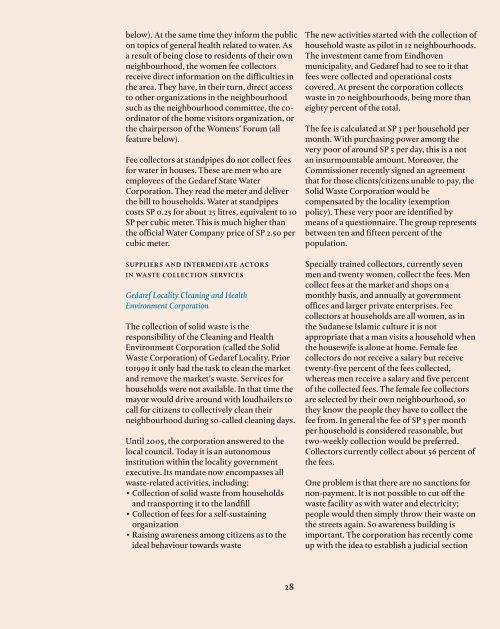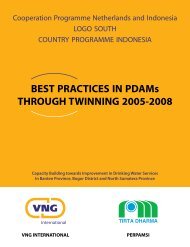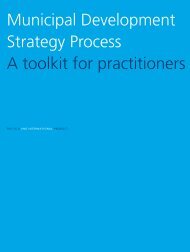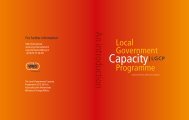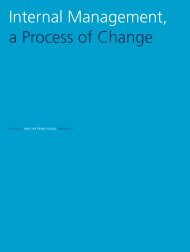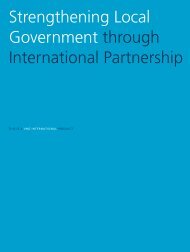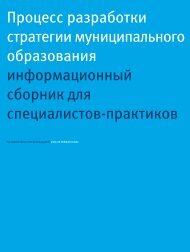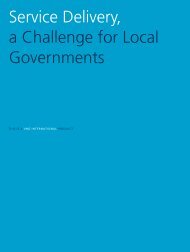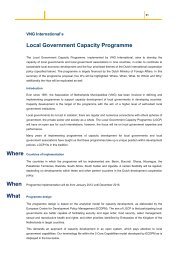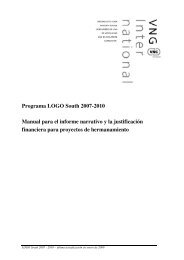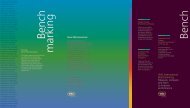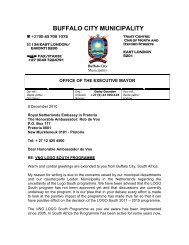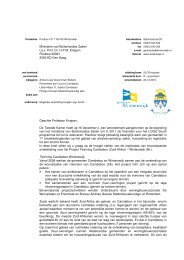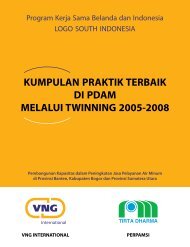Opmaak 1 - VNG International
Opmaak 1 - VNG International
Opmaak 1 - VNG International
Create successful ePaper yourself
Turn your PDF publications into a flip-book with our unique Google optimized e-Paper software.
elow). At the same time they inform the public<br />
on topics of general health related to water. As<br />
a result of being close to residents of their own<br />
neighbourhood, the women fee collectors<br />
receive direct information on the difficulties in<br />
the area. They have, in their turn, direct access<br />
to other organizations in the neighbourhood<br />
such as the neighbourhood committee, the coordinator<br />
of the home visitors organization, or<br />
the chairperson of the Womens’ Forum (all<br />
feature below).<br />
Fee collectors at standpipes do not collect fees<br />
for water in houses. These are men who are<br />
employees of the Gedaref State Water<br />
Corporation. They read the meter and deliver<br />
the bill to households. Water at standpipes<br />
costs SP 0.25 for about 25 litres, equivalent to 10<br />
SP per cubic meter. This is much higher than<br />
the official Water Company price of SP 2.50 per<br />
cubic meter.<br />
SUPPLIERS AND INTERMEDIATE ACTORS<br />
IN WASTE COLLECTION SERVICES<br />
Gedaref Locality Cleaning and Health<br />
Environment Corporation<br />
The collection of solid waste is the<br />
responsibility of the Cleaning and Health<br />
Environment Corporation (called the Solid<br />
Waste Corporation) of Gedaref Locality. Prior<br />
to1999 it only had the task to clean the market<br />
and remove the market’s waste. Services for<br />
households were not available. In that time the<br />
mayor would drive around with loudhailers to<br />
call for citizens to collectively clean their<br />
neighbourhood during so-called cleaning days.<br />
Until 2005, the corporation answered to the<br />
local council. Today it is an autonomous<br />
institution within the locality government<br />
executive. Its mandate now encompasses all<br />
waste-related activities, including:<br />
• Collection of solid waste from households<br />
and transporting it to the landfill<br />
• Collection of fees for a self-sustaining<br />
organization<br />
• Raising awareness among citizens as to the<br />
ideal behaviour towards waste<br />
The new activities started with the collection of<br />
household waste as pilot in 12 neighbourhoods.<br />
The investment came from Eindhoven<br />
municipality, and Gedaref had to see to it that<br />
fees were collected and operational costs<br />
covered. At present the corporation collects<br />
waste in 70 neighbourhoods, being more than<br />
eighty percent of the total.<br />
The fee is calculated at SP 3 per household per<br />
month. With purchasing power among the<br />
very poor of around SP 5 per day, this is a not<br />
an insurmountable amount. Moreover, the<br />
Commissioner recently signed an agreement<br />
that for those clients/citizens unable to pay, the<br />
Solid Waste Corporation would be<br />
compensated by the locality (exemption<br />
policy). These very poor are identified by<br />
means of a questionnaire. The group represents<br />
between ten and fifteen percent of the<br />
population.<br />
Specially trained collectors, currently seven<br />
men and twenty women, collect the fees. Men<br />
collect fees at the market and shops on a<br />
monthly basis, and annually at government<br />
offices and larger private enterprises. Fee<br />
collectors at households are all women, as in<br />
the Sudanese Islamic culture it is not<br />
appropriate that a man visits a household when<br />
the housewife is alone at home. Female fee<br />
collectors do not receive a salary but receive<br />
twenty-five percent of the fees collected,<br />
whereas men receive a salary and five percent<br />
of the collected fees. The female fee collectors<br />
are selected by their own neighbourhood, so<br />
they know the people they have to collect the<br />
fee from. In general the fee of SP 3 per month<br />
per household is considered reasonable, but<br />
two-weekly collection would be preferred.<br />
Collectors currently collect about 56 percent of<br />
the fees.<br />
One problem is that there are no sanctions for<br />
non-payment. It is not possible to cut off the<br />
waste facility as with water and electricity;<br />
people would then simply throw their waste on<br />
the streets again. So awareness building is<br />
important. The corporation has recently come<br />
up with the idea to establish a judicial section<br />
28


